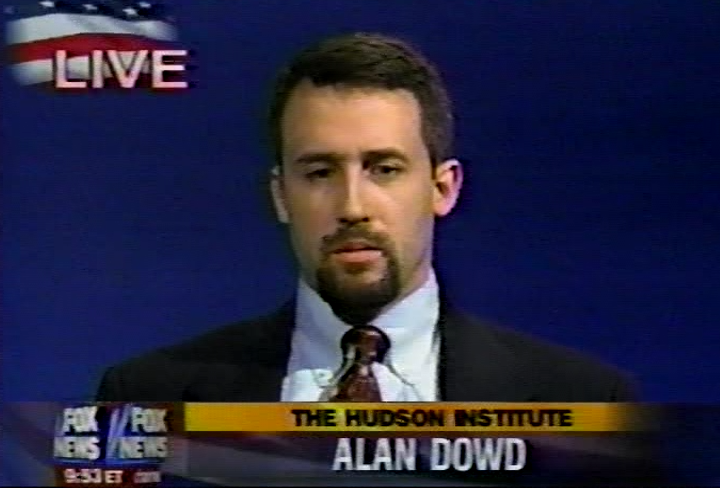
FOX News Channel's interview with Dowd about his "National Sabbath" article aired on August 17, 2002.
FOX News Channel: The attacks of September 11 shook this country to its core. Should the day be a national holiday or day of remembrance? Alan Dowd, assistant vice president of the Hudson Institute says, “yes.” And he has suggestions about what should be done. Good morning, sir.
AWD: Good morning. How are you, Bob?
FNC: I’m fine, hope you are as well. What should we do in your view?
AWD: The main thing I think we should do is make the day a kind of day of remembrance, and I think the model we have is September 14, which was the National Day of Prayer and Remembrance that the president declared last year. It was a day when we came together and stopped what we were doing. Some people went to places of worship. Some went to memorial sites. Many people gathered together and took time to reflect on what happened and also to look ahead at what was to come.
FNC: And you’re not talking about a national holiday—you’re talking about a different kind of day.
AWD: Exactly. It’s difficult to call that a holiday. I was in New York City last week, and when you walk through the World Trade Center site, when you walk through the Pentagon, when you go visit the site in Pennsylvania—you realize this is not something you can call a holiday. But it is something that needs to be remembered. It is something that needs to be preserved. We can’t allow this to be forgotten; we can’t allow this to become like some of our other holidays, which are covered over with what I call superficial gunk.
FNC: Three-day weekends and such…
AWD: Exactly.
FNC: What about the opponents who say that we’re letting the terrorists get to us if we break from our normal routines and constantly have a reminder of the day they essentially stopped our world?
AWD: Well, I think reasonable people can disagree about whether this is the best way to remember September 11, but I don’t think we can go on with our future without reflecting on it in some way every year. It’s a day unlike any day in American history. I hope and pray that there’s not another day like it. But what separates us from our enemy is that we value life; we value freedom; we value the differences that the terrorists so hate. If we can take a day to reflect on how special our country is because of that, I think we would do a great deal to keep us focused on the work that lies ahead in bringing peace to our world and securing our country, and in recognizing how much our country is exceptional. This is a special place.
FNC: How would you recognize this date differently from December 7, which recognizes Pearl Harbor?
AWD: As I mentioned in an aricle I wrote in National Review Online, I’m concerned that this date will become like December 7th, which is to say, December 7th passes unobserved by most Americans every year. It’s different from December 7th in one major way and it is this: On December 7th, Japanese naval forces attacked a military base in Hawaii…
FNC: And this was civilians…
AWD: These were civilians—all people at work, killed without warning or cause in the middle of everyday life. Our men who died at Pearl Harbor were killed without warning, but they were soldiers and sailors and Marines. This was a different kind of attack, though it shares some similarities—there’s no doubt about that.
FNC: We’ll leave it there. Alan Dowd, assistant vice president of the Hudson Institute. Thank you very much, sir.
AWD: Thank you, Bob. Thank you, Juliette.